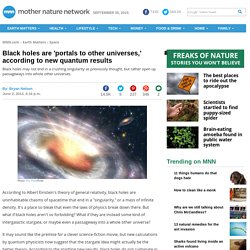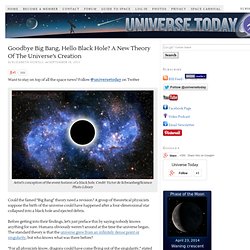

Quantum gravity takes singularity out of black holes - space - 29 May 2013. Falling into a black hole may not be as final as it seems.

Apply a quantum theory of gravity to these bizarre objects and the all-crushing singularity at their core disappears. In its place is something that looks a lot like an entry point to another universe. Most immediately, that could help resolve the nagging information loss paradox that dogs black holes. Though no human is likely to fall into a black hole anytime soon, imagining what would happen if they did is a great way to probe some of the biggest mysteries in the universe. Most recently this has led to something known as the black hole firewall paradox – but black holes have long been a source of cosmic puzzles.
According to Albert Einstein's theory of general relativity, if a black hole swallows you, your chances of survival are nil. Eventually, you'll reach the singularity, where the gravitational field is infinitely strong. Information paradox That would mean that black holes can serve as portals to other universes. Wormhole entanglement solves black hole paradox - space - 20 June 2013 - New Scientist#.UcOj1RG9KSM#.UcOj1RG9KSM#.UcOj1RG9KSM#.UcjPvipzZMt. WORMHOLES – tunnels through space-time that connect black holes – may be a consequence of the bizarre quantum property called entanglement.

The redefinition would resolve a pressing paradox that you might be burned instead of crushed, should you fall into a black hole. Knowing which hazard sign to erect outside a black hole isn't exactly an everyday problem. For theoretical physicists, though, it reveals an inconsistency between quantum mechanics and general relativity. Solving this conundrum might lead to the sought-after quantum theory of gravity. Relativity says if you fall into a black hole, you would die via "spaghettification" – a gradual stretching by ever-more intense gravitational forces. To preserve quantum monogamy, Polchinski suggested last year that the black hole-photon entanglement breaks down. That means the entanglement needn't be broken in the first place. There is still room for firewalls in the new wormhole definition. More From New Scientist More from the web. Black Holes May Not Be Infinitely Dense. Editor's Note: This article was provided by Inside Science.

The original is here. (ISNS) -- The cores of black holes may not hold points of infinite density as currently thought, but portals to elsewhere in the universe, theoretical physicists say. Wormholes May Save Physics From Black Hole Infernos. Are black holes surrounded by walls of fire?

Does this imply that one (or more) of our most cherished physical principles–and here I’m talking about biggies like quantum theory, the conservation of information or Einstein’s equivalence principle–is wrong? Any may our savior come in the form of wormholes? These are the questions consuming some of the world’s foremost theoretical particle physicists as they argue about potential solutions to what has become known as the “black hole firewall” problem–perhaps the most important paradox in physics since Stephen Hawking proposed his first black hole information paradox nearly four decades ago. Black holes are 'portals to other universes,' according to new quantum results.
According to Albert Einstein's theory of general relativity, black holes are uninhabitable chasms of spacetime that end in a "singularity," or a mass of infinite density.

It's a place so bleak that even the laws of physics break down there. But what if black holes aren't so forbidding? What if they are instead some kind of intergalactic stargate, or maybe even a passageway into a whole other universe? It may sound like the premise for a clever science-fiction movie, but new calculations by quantum physicists now suggest that the stargate idea might actually be the better theory. According to the startling new results, black holes do not culminate in a singularity.
This new theory is based on a concept known as 'loop quantum gravity' (or LQG). Researchers Jorge Pullin from Lousiana State University, and Rodolfo Gambini from the University of the Republic in Montevideo, Uruguay, crunched the numbers to see what would happen inside a black hole under the parameters of LQG. Related on MNN: Goodbye Big Bang, Hello Black Hole? A New Theory Of The Universe’s Creation. Want to stay on top of all the space news?

Follow @universetoday on Twitter Artist’s conception of the event horizon of a black hole. Credit: Victor de Schwanberg/Science Photo Library Could the famed “Big Bang” theory need a revision? A group of theoretical physicists suppose the birth of the universe could have happened after a four-dimensional star collapsed into a black hole and ejected debris. Before getting into their findings, let’s just preface this by saying nobody knows anything for sure. “For all physicists know, dragons could have come flying out of the singularity,” stated Niayesh Afshordi, an astrophysicist with the Perimeter Institute for Theoretical Physics in Canada who co-authored the new study. So what are the limitations of the Big Bang theory?